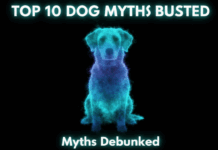Last Updated on January 31, 2024 by Dogs Vets
How to Stop a Dog From Eating Poop: Home Remedies That Actually Work
Let’s face it, scooping poop is a given when you’re a dog owner. But when your furry friend graduates from casual sniffing to enthusiastic feasting, it can turn a walk in the park into a gag-inducing obstacle course. Fear not, fellow dog lovers!
Before you resign yourself to a lifetime of plastic bag symphonies, there’s hope. This guide unveils a treasure trove of home remedies to help curb your dog’s poop-munching habit, restoring peace (and your olfactory sanity) to your daily routine.
Why Do Dogs Eat Poop? The Scoop on Coprophagy
Before we unleash our arsenal of home remedies, understanding the “why” behind your dog’s unsavory snacking is key.
Coprophagy (the technical term for poop-eating) isn’t always abnormal. Puppies often explore the world through their mouths, and ingesting stool can be part of their natural development.
However, persistent poop-appetite in adult dogs can stem from various factors, including:
- Nutritional deficiencies: Sometimes, a lack of essential nutrients like vitamins or enzymes can make feces appear enticing.
- Boredom or anxiety: Under-stimulated or stressed pups might turn to poop-eating as a form of entertainment or self-soothing.
- Medical conditions: Underlying health issues like intestinal parasites or digestive disorders can also trigger coprophagy.
Prevention is Key: Poop-Proofing Your Pup’s World
The first line of defense against poop-paloozas? Preventing access to the forbidden feast in the first place. Here’s how to outsmart your dog’s inner scavenger:
- Scooping superhero: Vigilantly clean up your yard and walking routes, leaving no tempting morsels behind.
- Leash on, poop patrol: Keep your dog on a leash during walks, allowing you to intervene before they get too close to any suspicious-smelling surprises.
- Litter box lock-down: If you have cats, invest in a covered litter box or keep it in a dog-free zone.
- Tasty distractions: During walks, carry high-value treats and engage your dog with play or training, diverting their attention from potential poop-treasures.
Home Remedies: The Secret Weapons in Your Arsenal
Now, if prevention isn’t quite enough, let’s unleash the power of home remedies! Remember, consulting your veterinarian is always crucial before implementing any new dietary changes or supplements.
1. Dietary Tweaks:
- Fiber Fiesta: Adding fiber-rich foods like pumpkin puree, grated vegetables, or cooked sweet potato to your dog’s diet can make stools less appealing and bulkier, reducing their digestibility.
- Probiotic Power: Introducing probiotic supplements can aid digestion and nutrient absorption, potentially making stool less enticing.
- Enzyme Enrichment: Digestive enzyme supplements can help break down food more efficiently, potentially minimizing the nutritional appeal of feces.
2. Taste Aversion:
- Pineapple Powerhouse: Raw pineapple contains bromelain, an enzyme that alters stool taste and odor, potentially making it less palatable. Just remember, moderation is key as too much pineapple can cause digestive upset.
- Apple Cider Vinegar Twang: Adding a small amount of apple cider vinegar to your dog’s food can alter the stool’s pH, making it less appealing. Start with a tiny amount and gradually increase if needed.
3. Training Techniques:
- “Leave it!” Masterclass: Teach your dog the “leave it” command. Reward them for ignoring distractions like poop during walks, eventually creating an association between the cue and ignoring the forbidden temptation.
- Swap and Reward: If your dog lunges for a poop pile, quickly offer a high-value treat in exchange. This positive reinforcement technique redirects their attention and creates a negative association with the poop.
4. Environmental Enrichment:
- Boredom Busters: Ensure your dog gets plenty of physical and mental stimulation through walks, playtime, and training sessions. A tired pup is less likely to seek entertainment in questionable forms like poop-munching.
- Scent Games: Engage your dog’s natural sniffing instincts with fun scent games. Hide treats or toys and encourage them to find them using their nose. This not only provides mental stimulation but also reinforces their focus on positive activities.
Remember: Consistency is key! Implementing these home remedies requires patience and perseverance.
Don’t get discouraged if you don’t see immediate results. Stick with it, and you’ll gradually break the poop-eating habit, restoring harmony and olfactory bliss to your life with your furry friend.
Bonus Tip: Consider consulting a professional animal behaviorist if the poop-eating problem persists or you suspect an underlying medical cause. They can provide personalized guidance and training strategies tailored to your dog’s specific needs.
5 Questions and Answers About Stopping Your Dog From Eating Poop:
1. Why does my dog eat poop in the first place?
There are several reasons why your dog might be engaging in this unsavory behavior. It could be due to nutritional deficiencies, boredom or anxiety, underlying medical conditions like intestinal parasites or digestive disorders, or even simply curiosity during puppyhood.
2. What are some natural remedies I can try at home?
Before rushing to drastic measures, there are several natural remedies you can try to curb your dog’s poop-eating habit. These include:
- Dietary tweaks: Adding fiber-rich foods like pumpkin puree or cooked vegetables to their diet can make stools less appealing. Probiotic supplements and digestive enzymes can also aid digestion and make feces less enticing.
- Taste aversion: Raw pineapple or a small amount of apple cider vinegar in their food can alter the stool’s taste and odor, making it less palatable.
- Training techniques: Teaching your dog the “leave it” command and offering high-value treats as distractions during walks can redirect their attention from potential poop piles.
- Environmental enrichment: Keeping your dog physically and mentally stimulated through exercise, play, and interactive toys can reduce boredom and stress, potential triggers for coprophagy.
3. Do commercial products work to stop poop-eating?
While there are some commercially available products like poop-deterring additives or sprays, their effectiveness can vary. It’s always best to consult your veterinarian before using them, as they may not be suitable for all dogs and could potentially have side effects.
4. Is getting my dog neutered a solution?
Neutering can sometimes help reduce certain behaviors, but it’s not a guaranteed cure for poop-eating. Consulting your veterinarian is crucial to determine if it’s the right choice for your individual dog and their specific reasons for this behavior.
5. I’ve tried everything, but my dog still eats poop! What now?
If home remedies and basic training haven’t yielded results, seeking help from a professional animal behaviorist is the next step.
They can assess your dog’s individual case, identify potential triggers, and develop personalized training strategies and techniques to effectively address the poop-eating behavior.
Remember, consistency and patience are key.
Don’t get discouraged if progress takes time. By understanding the “why” behind your dog’s behavior and implementing a combination of preventive measures, training techniques, and natural remedies, you can curb this unpleasant habit and restore harmony and olfactory bliss to your life with your furry friend.
Fact Check
We hope you enjoyed reading this article. What are your thoughts on the topic?
“At [Dogsvets.com], our goal is to bring you the most accurate and up-to-date information on all things pet-related.
If you have any additional insights or would like to advertise with us, don’t hesitate to get in touch.
If you notice any errors or discrepancies in our content, please let us know so we can correct them.
We welcome your feedback and encourage you to share this article with others.”























